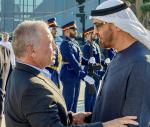You are here
Who makes the rules in the age of unpeace?
May 13,2022 - Last updated at May 13,2022
Mark Leonard Say More…
Project Syndicate (PS): In December, you predicted that the “defining fights of the twenty-first century will be about who has the power to make the rules.” With Russia’s invasion of Ukraine, this seems prescient. Could the sanctions on Russia, which capitalise on the West’s disproportionate power over the institutions underpinning economic interconnectedness to “punish” miscreants, hasten the demise of the Western-led rules-based order?
Mark Leonard: I think that the West was right to introduce tough sanctions on Russia in response to its aggression in Ukraine. Nonetheless, we should be worried about the sanctions’ long-term effects.
After the Cold War ended, the capitalist West’s institutions and systems were opened up to the rest of the world, enabling globalisation on a scale unseen since the late nineteenth century. Add to that the revolution in information and communications technology, and interdependence reached new heights. In this hyper-connected, networked world, the “winners”, including companies like Facebook, Google, Alibaba and Tencent, reap huge rewards.
While some non-Western entities have thrived, the West has long dominated the global system. In fact, it presented its companies, institutions, and norms as universal, almost like global public goods. The sanctions on Russia, which include cutting off Russian banks from the SWIFT international-payments messaging system, kicking Russian media companies off internet platforms, and restricting Russia’s access to the US dollar, undermine this narrative. Western-led institutions are now viewed in many parts of the world as instruments of Western power, rather than public goods. There will be consequences.
PS: Last month, you warned that, to prepare for a new era of continuous disruption and disorder — an “age of unpeace,” as you call it in your recent book — European policymakers must grapple with four sets of questions, including where NATO’s borders should be drawn and whether Europe is part of a regional or a global order. Which set of questions is Europe best prepared to answer?
ML: Europeans had a major geopolitical awakening on February 24. As Russia launched its war on Ukraine, they realised that we are not living in an era of global peace, underpinned by interdependence and a blurring of national borders. This is an era of permanent conflict, where the ties that bind us together can easily be weaponised.
This realisation has spurred the European Union to agree to equip Ukraine with lethal weapons, and to assess new measures for securing nearby countries like Moldova. It has prompted Germany and Denmark, among others, to pledge to raise defence spending to 2 per cent of GDP. It has motivated Finland and Sweden to consider applying to join NATO. And it has impelled all of Europe to rethink how to manage connections with others in ways that prevent vulnerability to blackmail.
All of this has confronted Europe with the immediate question of how to reduce dependence on Russian oil and gas. In the longer term, it will also have to think carefully about its dependence on Chinese and even American technology.
PS: While Russia’s war in Ukraine, you recently noted, has “put Europe and ‘Eurasia’ back at centre stage”, the Indo-Pacific remains strategically crucial. Last September, you criticised Australia’s security and technology arrangement with the United States and the United Kingdom, arguing that the new “AUKUS” grouping may leave China as the “strategic winner.” Do you expect China similarly to exploit the Ukraine war to its advantage? How might the Ukraine war reshape the Indo-Pacific?
ML: China is watching the war in Ukraine with great interest. It is hoping that conflict in Eastern Europe will distract the US from the Indo-Pacific, much as wars in the Middle East did for a decade after the terrorist attacks of September 11, 2001. It is also hoping that Ukraine’s plight will erode America’s credibility as a partner. If these hopes are realised, with Eastern Europe monopolising US attention and resources, and doubts among America’s Asian partners rising, China will probably move to challenge America’s commitment to its Indo-Pacific allies.
China is also paying close attention to the economic measures taken against Russia. If similar measures are imposed in response to, say, a Chinese invasion of Taiwan, China will be ready to resist them.
By the Way…
PS: In 2019, you warned that, “rather than taking back control, in an era of great power blocs the UK will find itself increasingly at the mercy of China, the US, Russia, and the EU”. Are there advantages or strengths that a strategically savvy UK could use or develop to reassert itself in this age of unpeace?
ML: The UK has lots of useful tools for the age of unpeace. Its weapons have been very helpful to Ukraine. Its intelligence and cyber-capabilities have also proved valuable. And the City of London’s enduring global status gives the UK power over, and information about, global financial networks.
But the UK, now outside the EU, will often find itself as a “rule-taker”, forced to choose whether to follow the rules made by the US, the EU, or China, rather than a rule-maker in its own right. It may be able to draw tactical advantages from its untethered geopolitical position, but the price will be a loss of strategic control over its destiny.
PS: In your 2005 book, Why Europe Will Run the Twenty-First Century, you argued that America’s power, based on military might, was too shallow and narrow to compete with Europe’s broad-based soft power. Now, however, hard power seems to be experiencing a resurgence, and the risks of connectivity are coming to the fore. How have events in the last 17 years changed your vision of Europe’s role in the emerging world order?
ML: I am still in awe of the geopolitical revolution that has taken place in Europe over the last few decades. A continent that was locked in permanent war has been transformed into a peaceful community where security is guaranteed by law rather than the balance of power, and successive waves of countries have been helped in their transitions from dictatorship to democracy. These are wonders of human history.
But the events of the last 17 years have shown how vulnerable the European political experiment is, both to external aggression from countries like Russia and to internal disruption by populist forces like Hungarian Prime Minister Viktor Orbán and French politician Marine Le Pen, who again made it to the second-round runoff in a presidential election. Rather than seeing the EU as a universal force that can inspire others around the world, I now see it as a beautiful and fragile experiment that needs to be protected from the world.
PS: The notion that we are entering an era of constant disruption and novel forms of conflict, in which the very factors that were long believed to support peace are now being used as tools of war, certainly appears bleak. Is there reason to hope for a more peaceful future, and what could help us get there?
ML: There has been a geopolitical awakening in many parts of the world, characterised by a new understanding of the dangers of uncontrolled connectivity. This has fueled the rise of an agenda for mitigating connectivity’s risks. This is reflected in the “build back better” concept in the US, the “dual circulation strategy” in China, and the “strategic sovereignty” discussion in the EU.
German Chancellor Olaf Scholz’s Zeitenwende speech further illustrates European leaders’ growing awareness of the fact that, in today’s reality, our most precious achievements are very fragile. Defending them will require changes to our economic model, our patterns of dependency, and our security policies. These changes should enable citizens to enjoy the advantages connectivity confers, but mitigate the potential of interconnectedness to create divisions within our societies and to expose us to external aggression.
Mark Leonard, director of the European Council on Foreign Relations, is the author of “The Age of Unpeace: How Connectivity Causes Conflict” (Bantam Press, 2021). Copyright: Project Syndicate, 2022.













